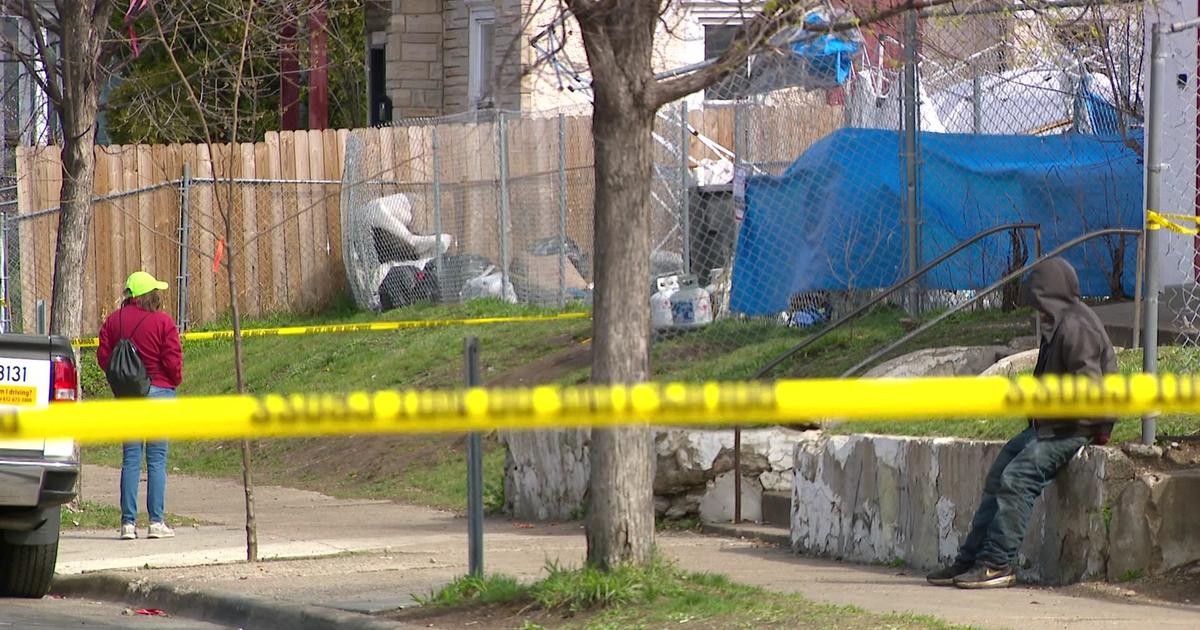'Antiquated' Lurking, Loitering Laws Have Long History In Twin Cities
MINNEAPOLIS (WCCO) - While laws banning loitering and lurking have deep roots in many Twin Cities communities, legal experts and social activists say they're often constitutionally questionable and contribute to racial inequality and an authoritarian police force.
The Minneapolis City Council voted to repeal its lurking and spitting ordinances earlier this month after criticism that they encouraged racial profiling. Mayor Betsy Hodges called the laws "antiquated" and "unnecessary" and spoke of helping "enable more equitable outcomes."
The move was praised by the American Civil Liberties Union and other legal activists, but they say more work is needed to address the large number of Twin Cities suburbs with laws still on the books that are at least as troubling as Minneapolis's repealed ordinances.
In a Coon Rapids city park, it's illegal to say anything "loud," "boisterous" or "insulting." A person found lurking in Brooklyn Park with the intent "to do any mischief" or "to commit any crime or misdemeanor whatever" can be imprisoned for up to 90 days or fined $1,000. In Maplewood and Cottage Grove, it's unlawful to loiter "in such a manner as to cause annoyance." In Minnetonka, you're forbidden from acting "in a manner not usual for law abiding individuals."
A WCCO analysis of the seven suburban cities with the most strongly worded loitering and lurking laws found that police enforcement varies dramatically.
Over the last five years, Maple Grove, Eden Prairie, Cottage Grove and Edina had no arrests for lurking and loitering. Since 2010 in Maplewood, there were 114 arrests or citations related to the city's ordinances. Brooklyn Park recorded 32 incidents. In Minnetonka, the figure was 25.
How police apply the laws also fluctuates.
Brooklyn Park crime analyst Jody Murphy said police usually enforce the city's loitering law when business owners complain about people "disturbing legitimate customers."
Minnetonka police chief Jeff Sebenaler said his officers often stop people under the city's loitering ordinance but end up arresting them for trespassing, theft, curfew violations, underage consumption and other petty crimes.
"There're a lot of times where a specific crime hasn't been yet committed," Sebenaler said, "but the activity is suspicious enough that it gives us a chance to intervene."
Teresa Nelson, the legal director of the Minnesota ACLU, said the latitude allowed to law enforcement under loitering and lurking laws is dangerous and possibly illegal.
"These laws punish being in public or private places, looking suspicious and being perceived by police as having bad thoughts," she said.
Business owners and others who support loitering and lurking laws tend to stress the importance of keeping the peace.
After the Minneapolis city council repealed the lurking and spitting ordinances, Steve Cramer, the president of the city's Downtown Council spoke up.
"Whether it's lurking or loitering or aggressive panhandling, any number of these so-called 'low-level offenses' really are important to have on the books and to enforce when necessary to keep downtown and neighborhoods the way we want it for everybody who lives here," he said.
It's a complicated issue, but whether your views align with Nelson's or Cramer's often boils down to a simple question: Do you trust the police?
Many don't.
Nekima Levy-Pounds, a St. Thomas law professor affiliated with the group Black Lives Matter, said laws proscribing low-level crimes like loitering and lurking actually inflate the crime rate.
"Cracking down on minor offenses is supposed to curb larger crime, but it actually creates more problems, particularly in our poorer, most vulnerable communities," she said. "It winds up being a self-fulfilling prophecy where these laws help to fuel greater contact with the criminal justice system for low-income people."
A Long Legal History
Loitering laws date back to at least the 1940s and '50s in Minnesota. The laws are understood in academic literature as an outgrowth of English vagrancy laws, which initially had an economic rationale -- to punish able-bodied men who refused to work -- but later became a form of crime prevention and removing undesirables.
The laws' legal standing in Minnesota is largely dependent on a 47-year-old decision by the Minnesota Supreme Court. In the 1968 case State v. Armstrong, the court upheld Minneapolis's lurking and loitering ordinance, ruling that the words "loitering" and "lurking" are "not as ambiguous or vague as might appear from first impression."
But Nelson said that a number of subsequent U.S. Supreme Court decisions, and interpretations by courts in other states, have contradicted State v. Armstrong. She says Minnesota's ruling is dated and likely to be overturned.
In 1972, the U.S. Supreme Court found a Florida vagrancy ordinance prohibiting "wandering or strolling" without lawful purpose to be unconstitutionally vague. (The majority opinion noted that "wandering or strolling" from place to place has been triumphed by American luminaries as dissimilar as Walt Whitman and The Happy Wanderer.)
In 1999, the Supreme Court struck down Chicago's gang loitering ordinance as too vague and recognized "the freedom to loiter for innocent purposes" as protected by the Fourth Amendment's due process clause.
Nelson said that in order for a law to criminalize lingering in a public space, it must meet these criteria:
- Illegal conduct is adequately defined so that a reasonable person would understand what is prohibited and police have sufficient guidelines to prevent arbitrary and discriminatory enforcement.
- Innocent conduct is coupled with an overt criminal act or the intent to commit a crime specified in the law.
- The law doesn't violate constitutionally protected speech or conduct.
'A Hard-Working Man'
In Minnetonka, most police reports related to loitering and lurking detail unambiguous criminal acts -- drunken trespassing, bike theft, peeping toms.
Sebenaler, the city's police chief, said the ordinance allows police "to be proactive and not reactive."
But on the evening of July 3, 2014, a 911 call led to a situation that underscores the potential danger of writing laws to defend against a crime that, as Sebenaler said, "hasn't been yet committed."
A half hour before midnight, a woman called police to say she believed someone was breaking into her apartment on Cedar Hills Boulevard.
The woman gave no description of the suspected burglar and when police called her back, she didn't pick up her phone. When police looked for her later, she couldn't be found.
Arriving at the apartment building, police saw, "at a distance, a tall black male walking towards the southwest corner of the parking lot."
He seemed nervous, glancing back at police as he walked toward an SUV. A police officer looked for him behind the SUV but he wasn't there. So the officer yelled for him to come out.
The man was on the other side of the SUV. The police report says he was crouching and that, when he heard the scream, he "jumped out" and started walking toward the officer. The officer drew his gun and ordered the man to the ground.
"I didn't do anything," the man said, lying down. "I'm a hard-working man."
The man, whose first name is Frederick, had a misdemeanor petty theft warrant from Koochiching County. The warrant was non-extraditable, a fact Frederick may not have realized.
Frederick said he had been dropped off at a nearby gas station and was coming to see his friend Heather, whose apartment number he gave to police.
It appears from the police report that officers did not make an effort to check whether a woman named Heather lived in the apartment. "It is unknown if [Frederick] was at the Cedar Hills Apartments with 'Heather,'" the report says.
(The police officer also wrote in the report that Frederick "was not very clear about his reason for being in the area." And in a Tuesday interview, police chief Sebenaler said his officers told him they checked the apartment and weren't able to substantiate Frederick's story.)
Minnetonka's loitering ordinance requires a suspect to "explain his/her presence and conduct" in order to dispel a police officer's alarm.
Sebenaler said because Frederick was unable to dispel alarm and because his Koochiching County warrant made him appear suspicious, officers decided to arrest Frederick.
Frederick was handcuffed and taken to Hennepin County Jail. The arresting officer issued him a tab charge for lurking, and he was later given a $150 fine. In January, Frederick's fine was forwarded to a collections agency.
Sebenaler said the shady circumstances surrounding Frederick's presence in the parking lot justified the arrest.
"You're getting a call from a person who says their home is being broken into," he said. "There are not a ton of people at 11:30 p.m. walking around, and you see one person in the lot who ducks behind a car. That raises a suspicion, and he's unable to dispel the alarm."
But Nelson, the ACLU attorney, said the inability to dispel suspicion is not grounds for arrest. It is unfortunate, she said, Frederick pleaded guilty without an attorney and the charges were never tested by a court.
"I think there was probably enough suspicion to justify a Terry stop" -- a brief detention -- "but criminal charges seem pretty thin," she said.
Nelson said arrests like Frederick's point to a larger problem.
"When you have laws," she said, "that criminalize ordinary conduct -- waiting for a bus or hanging around talking to friends on a street corner -- it gives police a wide amount of discretion, which leads to arbitrary enforcement, which leads to discriminatory enforcement."
By Zac Farber



